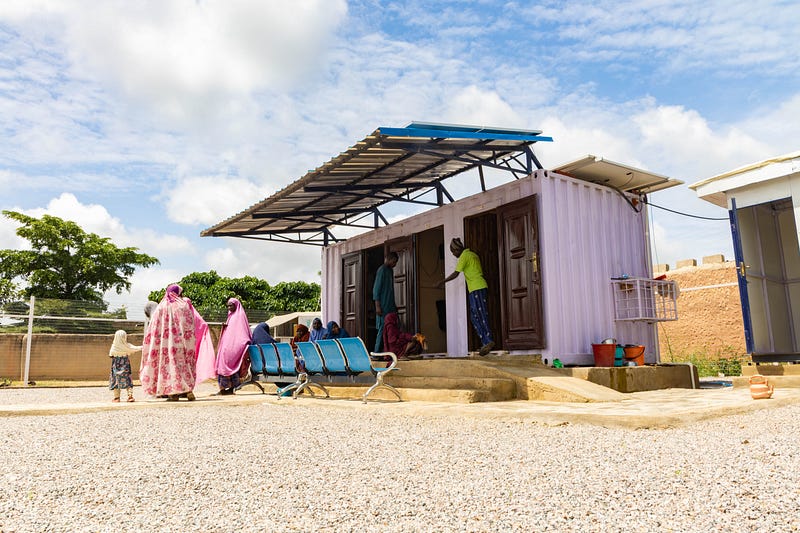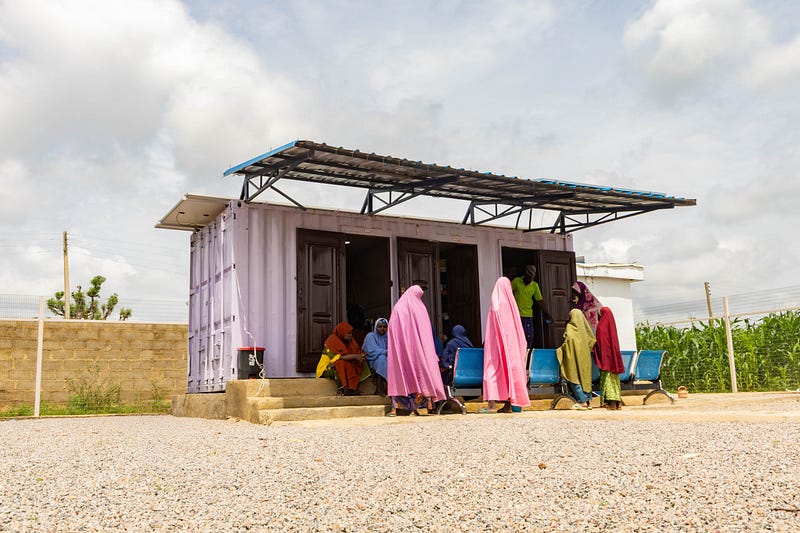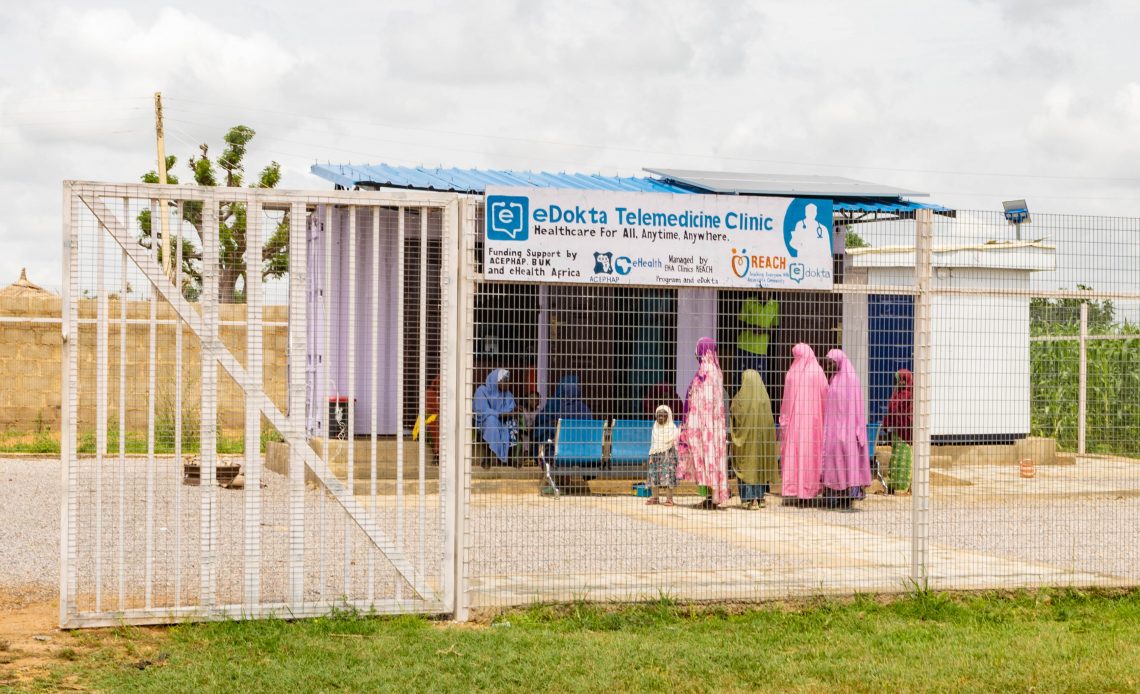Mahdi Garba (Lead writer)
Salamatu Yusuf, a resident of Yanoko in Tofa Local Government Area (LGA) of Kano remembers how she used to walk about five kilometres, anytime she wants to access healthcare. This was her reality until February 2025, when the eDokta Telemedicine Clinic was launched in the Yanoko.
“Before this clinic was brought to this community, we spend at least ₦600 to ₦800 on transport before we can access care. Now, it is in our community,” Sadiya, the 22-year-old mother of two explained. “Since it opened, I have gone there like five times to access care. I like this clinic, and I like how hospitable the workers are. The workers treat one like their relative. They listen to their patients without any judgement.”

Image credit: Nigeria Health Watch
Maternal and infant mortality rates are among the highest in Nigeria’s northwest zone, where Kano is located. The state records the highest maternal mortality rate (MMR), with 502 per 100,000 live births, which exceeds the national target of 288 per 100,000. Within Kano, Tofa LGA has the highest MMR among the state’s 44 LGAs.

Aminu Ayuba, project manager for eHealth Africa’s Reaching Everyone with Accessible Community Health (REACH) programme explained that data from Bayero University Kano’s Africa Centre of Excellence for Population Health and Policy (ACEPHAP) revealed that Tofa is underserved in healthcare access. The REACH programme, a locally driven initiative delivering affordable, high-quality primary healthcare to underserved communities stepped in to fill the gap.
Within Tofa, Yanoko is much more underserved due to its scattered hamlets and nomadic settlements, with no healthcare facility serving these communities. This made it the ideal location for the telemedicine clinic.
Healing beyond borders
Isma’il Rabiu, a registered nurse at the eDokta clinic, attends to patients and listens to their complaints. He explained that whenever a case goes beyond his capacity, he calls in a doctor for support. “We have a space for telehealth consultation where I can call a doctor from our branches to have a live call that will enable him to counsel the patients,” Rabiu, who also educates the patients on health issues, explained.

Image credit: Nigeria Health Watch
Rabiu explained that he uses the telemedicine platform to check which doctor is available. Once connected, the patient remains at the clinic while consulting with the doctor remotely. If medication is needed, the doctor issues a prescription, and the prescribed drugs are dispensed on-site at the telemedicine clinic. The nurse noted that when the clinic launched, they saw only one to two patients daily. Now, less than a year, they receive seven to eight patients daily, rising to 10 during the rainy season where malaria cases surge.

Ayuba, the project manager, noted that the eDokta clinic focuses on maternal and child health, nutrition and non-communicable diseases (NCDs) while providing other services typical of primary healthcare (PHC) facilities. The clinic also uses the WHO PEN protocol for the management of diabetes, hypertension and sickle cell disease, which was newly added.
“From January 2025, when we started, we have provided services to about 57 pregnant women who have carried their pregnancy to term,” Ayuba explained. “We currently have 12 women who have been enrolled on our Antenatal Care [ANC] empanelment where they are able to get home visits by our healthcare workers. They also get access to micronutrient supplementation which was graciously donated to us by Vitamin Angels.”
He further explained that healthcare workers have been trained to provide ultrasound services at home using a butterfly probe, a portable, point-of-care diagnostic ultrasound system. Health workers at the clinic place strong emphasis on completing ANC, setting a target of ‘ANC 4 plus,’ which requires every pregnant woman to attend at least four ANC sessions, including one ultrasound scan.

Highlighting the importance of immunisation, Ayuba noted that vaccine-preventable diseases remain a leading cause of neonatal and child deaths. This is why they ensure that all children under five complete their full immunisation schedule.
The standard adult consultation costs ₦300, which covers access to a qualified doctor and follow-up care by on-site community health workers. However, consultations for maternal, child health and non-communicable diseases like hypertension and diabetes, are free of charge.
‘It has been a success’
According to Ayuba, “the programme has been a success. What we have been trying to prove is a sustainable model for PHC delivery, by integrating technology into it. Telemedicine helps us bridge the gap between patients and the healthcare providers. And, we have been able to do that.”
He also highlighted that many patients have accessed good care from professionals, which without the provision of the telemedicine initiative, would be difficult for them.
From the beginning, the health workers understood that epileptic power supply is one of the reasons clinics do not operate as much as they should, this led them to set up a renewable energy system in the clinic, which makes the clinic completely solar-powered and it does not rely on the country’s grid. Regarding internet, the clinic is connected to a high-speed satellite internet launched by a tech-forward space company, which is covered under the eHealth Africa subscription.

Image credit: Nigeria Health Watch
Habibu Muhammadu Adamu, the ward head of Yanoko who witnessed the establishment of the telemedicine clinic from inception to its actualisation expressed his appreciation to EHA REACH Clinic for establishing the telemedicine clinic in their village. “The [same] way one will go to Malam Aminu Kano Teaching Hospital and meet specialised doctors is how one can be linked to these doctors [through computer], who counsel patients on the best way to care of themselves,” the community leader emphasised.
He added that patients from neighbouring LGAs, including Bagwai, Rimin Gado and Dawakin Tofa travel to the clinic and to access care with ease, and all the prescribed medications are consistently available on-site.
Multifaced challenges
Ayuba cited regulation as a bottleneck they faced at the onset of the programme, particularly around licensing and compliance for digital health services. He explained that the Kano State Private Healthcare Institutions Management Agency (PHIMA) are clear about what they describe as a PHC facility. The introduction of telemedicine or digital clinic is a new concept and there are no guidelines for that.
He also noted that with close working relationship with the regulators in the state, eDokta was able to overcome the challenge.
Another issue faced by the telemedicine clinic is staff retention because of its remote location. However, with a better renumeration, they were able to overcome that challenge too.
According to Ayuba, patient affordability remains a challenge. As a non-government facility, they need the patients to pay for services, but eDokta is currently exploring ways to enrol village residents in the Kano State Healthcare Contributory Management Agency (KSCHMA) health insurance scheme.

Image credit: Nigeria Health Watch
A standard adult consultation costs ₦300, covering access to a qualified doctor and follow-up care by on-site community health workers. However, consultations for maternal, child health, as well as non-communicable diseases (NCDs) such as hypertension and diabetes are provided free of charge, ensuring vulnerable groups continue to receive essential care despite financial barriers.
Rabiu, the nurse-in-charge at the clinic, noted that many people in the community are still unaware of the facility’s existence. He explained that new patients often mention they did not know a telemedicine clinic was available in their community. To address this, he said the EHA Clinic plans to carry out a second outreach to raise more awareness about the facility.
Ayuba explained that one of the key lessons he learnt in the project is community involvement, explaining that the community has been supportive since the commencement of the project.
He commended stakeholders such as the eHealth Africa Foundation, the leadership of EHA Clinic, eDokta Healthcare Company, and partners like Bayero University Kano’s ACEPHAP. The centre, supported by the World Bank, focuses on improving public health across parts of the continent through training, research, and cross-sector collaboration to inform better policy decisions.


